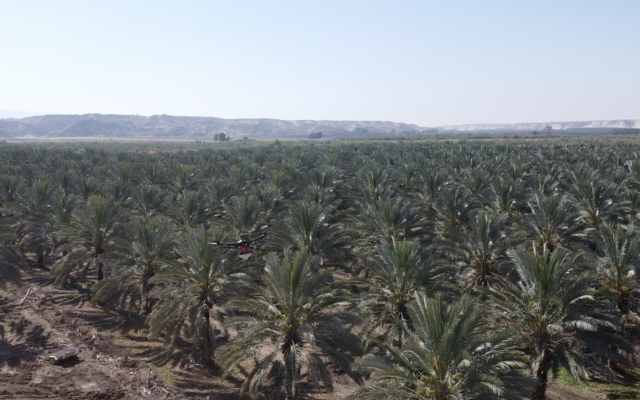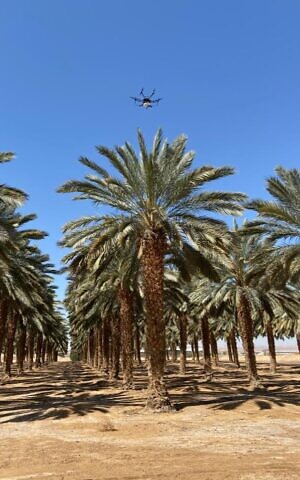Blog entry by Bruce McPherson

Date trees in the Jordan Valley pollinated by Blue and White Robotics and Dropcopter (Courtesy)
Project will use drones of Tel Aviv-based Blue and White Robotics and Dropcopter’s pods to disperse pollen from air, replacing bees amid worker shortage due to coronavirus
Blue and White Robotics, a drone-maker founded by Israeli Air Force veterans, has teamed up with a Syracuse, New York-based aerial crop pollination firm to carry out a large-scale pollination project in the Jordan Valley and help date growers cope with a shortage of manpower due to the coronavirus.
The joint venture between Tel Aviv-based BWR and Syracuse’s Dropcopter will enable the artificial pollination of the dates using aerial drones, BWR said in a statement on Wednesday.
Pollination is naturally done by bees, but the bee population is declining globally. To help growers overcome this problem, Dropcopter has developed a pod to store and dispense pollen from the air, suitable for a wide range of drones.
Using BWR’s operating system and command and control centers, multiple pollination drones can fly simultaneously, providing on-site operations., the statement said.

After a successful preliminary experiment conducted in recent months to test palm pollination at the Arava R&D Research Institute, led by Israeli researchers, many growers contacted BWR to request pollination services in the Jordan Valley, the statement said.
In Israel, date plantations total around 15,000 acres. Pollination, typically done using low-efficiency fans attached to tractors, is generally a four-week process, depending on weather and location, and is performed February-April. Each tree gets pollinated four times during the pollination period and requires a great deal of manpower and time that are currently unavailable due to the impact of COVID-19. The spread of the virus has closed borders and growers are finding it difficult to recruit workers locally.
In addition, heavy rain has caused flooding in the Jordan Valley, and is presenting a “significant challenge” for growers, making it “near impossible” to do ground pollination in many areas, the statement said.
Now, the process has been replaced with the new system that disperses pollen from the air, BWR said.
BWR was founded in 2017 by Ben Alfi, the CEO; Yair Shahar, the chief operating officer; and Aviram Shmueli, the chief technology officer. The firm has developed a platform to manage multiple autonomous aerial and ground tools operating in the same area, that can be remotely controlled through advanced command and control centers. BWR has customers in Israel and around the world, the statement said, and operates in the fields of agriculture, transportation, security, rescue, energy, and conducts hundreds of flights daily.
Dropcopter specializes in aerial artificial pollination of orchard crops via unmanned aircraft systems. The company conducts research into artificial pollination efficiency with the help of researchers from Cornell University and others. Dropcopter’s solution enables crops to increase yield and helps cope with the reduction of the global bee population, the statement said.
In March, BWR obtained a $1 million investment from the US-Israeli BIRD Foundation for a project between BWR Israel and Easy Aerial USA to develop a multi-mission command and control system for various types of UAVs for national security operations. The project was selected by the US Department of Homeland Security and Israel’s Ministry of Internal Security as part of the BIRD HLS program, which aims to develop advanced homeland security technologies.
By SHOSHANNA SOLOMON